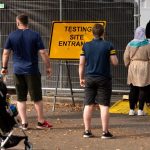“Significant” delays meant probation staff who assessed Jordan McSweeney before his release from prison were only allocated the case nine days before he was let out into the community, a watchdog has found.
McSweeney, 29, attacked and killed law graduate Zara Aleena in Ilford, east London, on 26 June last year, just nine days after being released from HMP Belmarsh.
A damning report by the UK’s Chief Inspector of Probation has found there was a catalogue of errors in the Probation Service’s handling of McSweeney’s release, which meant he was not treated as a high-risk offender and was “free” to commit this “most heinous crime”.
Among the issues flagged in the report was a two-month delay in formally assigning the case, meaning probation officers had less than a fortnight to carry out important assessments and planning for his release.
When the case was assigned, it was handed over with a “lack of detail” to a newly-qualified probation officer, the report found.
It also found delays in signing off on a recall to prison issued for McSweeney following his release.
Though the report does not suggest that without the delays Ms Aleena’s murder could have been prevented, it does say that the chance to have located and arrested McSweeney “would have been maximised”.
In December, McSweeney was sentenced to life with a minimum term of 38 years after pleading guilty to the law student’s murder.
A life-long offender
McSweeney was well known to the probation service, with a long history of offending stretching back to 2005 when he was reprimanded for two assaults at the age of 12.
After being punished for burglaries in his teenage years, he was given his first conviction for violence in 2010 when he was convicted of causing actual bodily harm (ABH).
McSweeney, whose offending was, according to the report, mostly motivated by his need for money to feed his addiction to drugs and alcohol, was later handed a series of burglary-related prison sentences,
After being granted parole in 2020 for a burglary offence, he was charged with carrying a weapon, criminal damage, and racially aggravated public order offences while in prison.
It was for these offences that McSweeney would be jailed and eventually released in the days before his murder of Ms Aleena.
Delays in assigning his case
McSweeney was out on licence – serving the remainder of a sentence in the community whilst sticking to certain conditions – in November 2020 when he was charged with the prison offences.
He remained out of prison until February 2021 when he was arrested on suspicion of robbery and causing grievous bodily harm (GBH) – charges he was later found not guilty of.
However, as a result of the new charges, he was recalled to prison to serve the remainder of his 2020 burglary sentence.
The sentence expired in October 2021, after which McSweeney was held in custody until April 2022, when he was sentenced to 16 months for the prison-related offences.
His time spent on remand was taken off his total sentence, giving him a release date of 17 June 2022.
Please use Chrome browser for a more accessible video player
Owing to the short time until release, McSweeney should have then been assigned a community offender manager, the UK’s Chief Inspector of Probation found.
However, according to his report, this did not happen until June, leading to a two-month delay in the formal allocation to a named probation officer.
During that time, his report said, there was “limited contact” between the prison offender manager and the community probation officer, due to “excessive workload and the limited time available”.
Read more
Zara Aleena’s aunt: Probation failings ‘extremely distressing’
Serious probation failings over law graduate’s killer, watchdog finds
The case was formally assigned to the probation officer on 9 June 2022, nine days before his release, giving limited time for pre-release planning and assessment.
It was handed to a newly-qualified probation officer, who was assigned McSweeney because they had previously worked on his case.
McSweeney’s release from prison was signed off with conditions for drug testing and a requirement to attend a well-being service.
However, the official did not opt for use of an electronic GPS monitoring tag, something which the report said could have been applied.
McSweeney is released
According to the report, in February 2022 McSweeney’s mother had asked probation staff not to release her son to her address because she was concerned he would reunite with associates in the area who could lead him back into a life of crime.
Despite the probation service having no clarity of where he would stay after his release, McSweeney left HMP Belmarsh on 17 June 2022. He failed to attend the well-being service later that day.
His mother confirmed to probation that he was drunk and at her address. Probation staff issued a warning to McSweeney for non-compliance with his licence conditions.
According to the report, an instant recall to prison could have been considered at this stage, but it was “usual” for staff to offer offenders deemed “medium risk”, as McSweeney was, further opportunities to attend.
Please use Chrome browser for a more accessible video player
“A term used was that cases such as McSweeney would usually ‘rock up’ at some stage,” the UK’s Chief Inspector of Probation found.
“This was indicative of using a generic approach … rather than assessing a case on its own merits,” his report added.
McSweeney did not attend two further meetings and, by 22 June, had not been seen by his mother or the police in five days.
According to the report, McSweeney’s probation officer then initiated recall proceedings. However, a senior staff member did not countersign the request for 48 hours – despite there being a 24-hour target time.
The recall notice was issued at 4.10pm on 24 June, less than 48 hours before McSweeney murdered Ms Aleena in the early hours of 26 June.
The report said: “National data on recalls shows that the median time between licence revocation and a return to prison custody is three days.
“Had a recall been initiated following the missed appointment on 20 June, or completed within the specified timescale on 23 June, the time for police to locate and arrest McSweeney would have been maximised.”






















